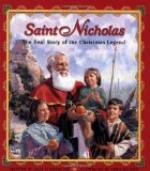“I know not if the new-waked soul
That stirs in every heart I see
Has yet to reach the far-off goal
Whose symbol is this Cross-shaped Tree....
“But, O dumb kindred of the skies,
O kinsfolk of the pathless seas,
All scorn and hate I exorcise,
And wish you nought but Love and Peace!”
* * * * *
Thus, on that Christmas-day of old
St. Colum broke the ancient spell.
A thousand years away have rolled,
’Tis now ... “a baseless miracle.”
O fellow-kinsmen of the Deep,
O kindred of the wind and cloud,
God’s children too ... how He must weep
Who on that day was glad and proud!
THE CHRISTMAS SONG OF CAEDMON
H.E.G. PARDEE
About the year 650, among the servants in the ancient Abbey of Streonschall, there was a cowherd whose name was Caedmon. The habits of the people of that age were simple and rude; their houses were comfortless huts, their dress was made from the skins of their flocks, or from animals taken in the chase; they had no books, and their literature was limited to the Latin manuscripts of the Church, which few of the monks even were learned enough to read, and fewer still to translate. Amid such influences, the life of a cowherd could scarcely be lifted above that of the beasts he cared for; if his hunger and thirst were satisfied, he would ask no more than a pleasant, daisied meadow in summer, and a warm nook in the winter. But Caedmon had a sensitive nature, that craved something nobler. When the minstrels struck their harps, and sung the wild traditions and fierce conflicts of their tribes and the guests followed with boisterous jest in their uncouth ballads, Caedmon sat silent and gloomy.
One evening, as the harp, passing from one to another, drew nearer him, dreading the oft-repeated taunts of his fellows, he crept away in the shadows, and went to his only bed,—a truss of straw.
After a while he slept, and in his sleep some one of lofty stature, and with kindly-beaming eyes, stood beside him, and commanded him to sing. “I cannot,” replied Caedmon, despondingly.
“Sing!” was the uncompromising answer.
“What shall I sing?”
“The origin of all things.”
Immediately before his quickened sense swept a vision of Creation, and to his glad surprise he described it all in song. The next morning he remembered, and repeated it; and the monks, hearing of it, took him into the monastery, and taught him scenes and sentences from the Bible, which he rendered into verse, and so became the first of the long line of sacred poets.




